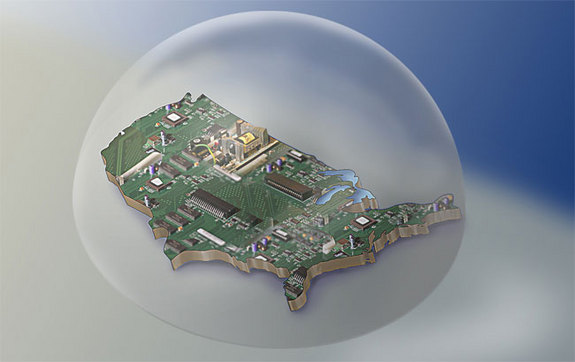NEW YORK – With advanced malware rendering antivirus software
essentially useless, and cloud networks like Gmail putting all of your
data eggs in one basket, how can you trust remote servers to keep your
info safe? According to Stephen Hanna of Juniper Networks, the answer
involves switching from security software to security hardware.
Speaking at the New York Institute of Technology cyber security
conference last Wednesday, Hanna detailed how only dedicated security
chips can provide the security, and security verification, needed to
make cloud computing safe and reliable.
“[With cloud computing], it becomes all the more important to have
confidence in the security of those systems. Otherwise, malware can
insert itself, and the service on which you are depending becomes
unreliable,” Hanna told TechNewsdDaily.

“With Gmail, you don’t really know where or how it’s running. You
just have to trust that it’s secure. Having hardware security can give
you greater confidence in that.”
Unlike security software,
which runs on vulnerable multipurpose equipment, hardware security
devices are designed for only one purpose. Since these security chips
only run a few clearly delineated programs, there’s nowhere for malware
to hide, Hanna said.
Not only do these chips protect themselves by shutting down if they
detect any activity outside of their original programming, but some,
like Trusted Computing Group’s TPM module, even respond to physical
stimuli. If the chip senses any drastic changes in electricity flow,
fluctuations in temperature or breaches of its physical casing, it
erases all of its sensitive data. General purpose hard drives simply
can’t match that level of security, Hana said.
“There are so many ways to get your machine infected, and when you
move from software to hardware, you take care of the ability of all
those viruses to get your security keys,”
Hanna said. “Of course, someone could still steal your computer, take
it to a lab, and crack it that way, but that’s a spy scenario that’s not
likely.”
Most importantly from a trust standpoint, a user can check whether or
not a cloud computer uses these security hardware devices. Each
hardware security device comes with a digital certificate that is almost
impossible to fake, Hanna said. By checking for that digital
certificate, a user can rest assured that their data is safe, even if
they can’t physically check the computer it’s on.
Thanks to those advantages, security hardware has become a focus of
some of the largest computer companies in the world. Last month,
chip-giant Intel bought the antivirus company McAfee, a move that signals how interested the market is in this new technology.
This is not to say that hardware security devices are impregnable. In
February, computer engineer Christopher Tarnovsky successfully defeated
the security on the TPM module. However, Tarnovsky needed far more time
and resources to defeat the hardware than he needed to breach even the
tightest software security.
This proves that while not perfect, hardware security at least improves upon software enough to inspire confidence.
No comments:
Post a Comment